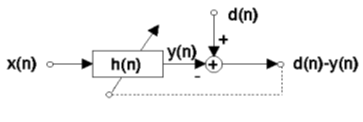An adaptive filter based on recursive blockmatrix inversion
- Status
- Open
- Type
- Master Thesis
- Announcement date
- 05 Mar 2018
- Mentors
- Research Areas

Short Description
The optimal solution of the linear filtering problem suffers from a number of drawbacks: first of all it requires known signal statistics to compute the Wiener-Hopf solution. Second, the autocorrelationmatrix of the filter input x[n] has to be inverted, which is again not practical in most real (especially real-time) applications. Simple algorithms like the LMS achieve good results but can suffer from other drawbacks such as slow convergence towards the optimal solution.
The aim of this work is to evaluate a new algorithm that allows a recursive inversion of the autocorrelation-matrix, termed the Rsc4bi (Recursive splitting of the correlation matrix into 4 (four) blocks for inversion) algorithm, and examine possible strengths, pitfalls as well as fields of use. After simulations to initially examine the algorithm there is also the possibility of testing in real world scenarios as well as scientific publication of the results.
Key Tasks
- Implementation and analysis of the Rsc4bi-algorithm
- Comparison with various standard algorithms
- Analysis of strengths, weaknesses and fields of application
Your Profile
- Very good knowledge in Adaptive Filter Theory (e.g. Adaptive Systems lecture or comparable)
- Strong background and interest in signal processing
- Very good knowledge in Matlab programming
Preferred Timeline
March 2019 - December 2019
Contact and Additional Information
Gerhard Graber (graber@rugraz.at)
Thomas Wilding (thomas.wilding@tugraz.at or 0316/873 4364)
Supervisors
Gernot Kubin, Gerhard Graber, Thomas Wilding
